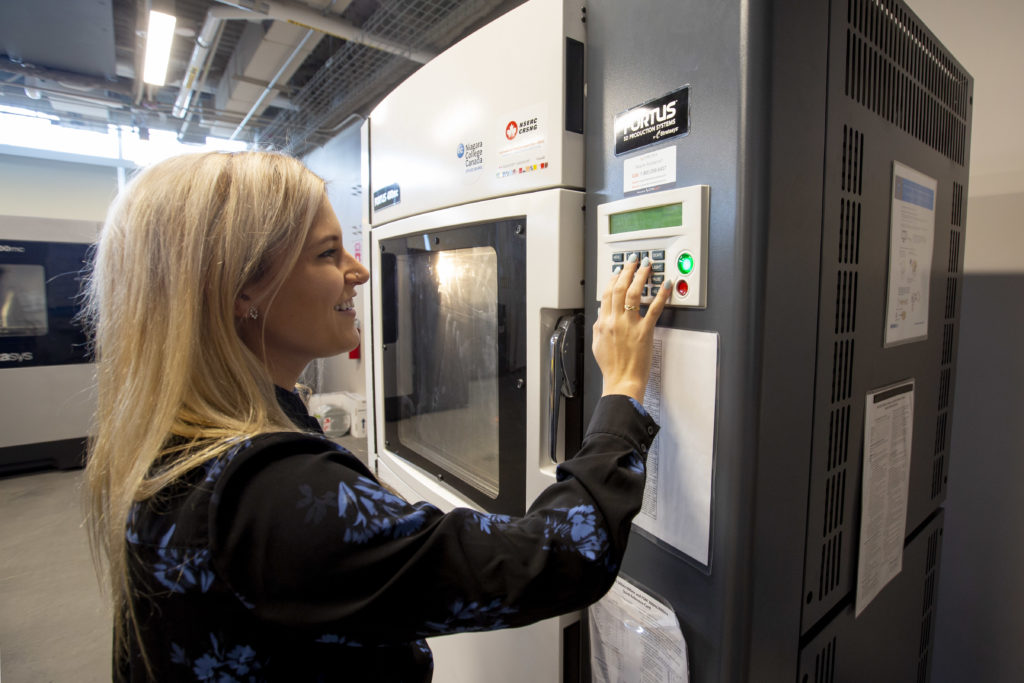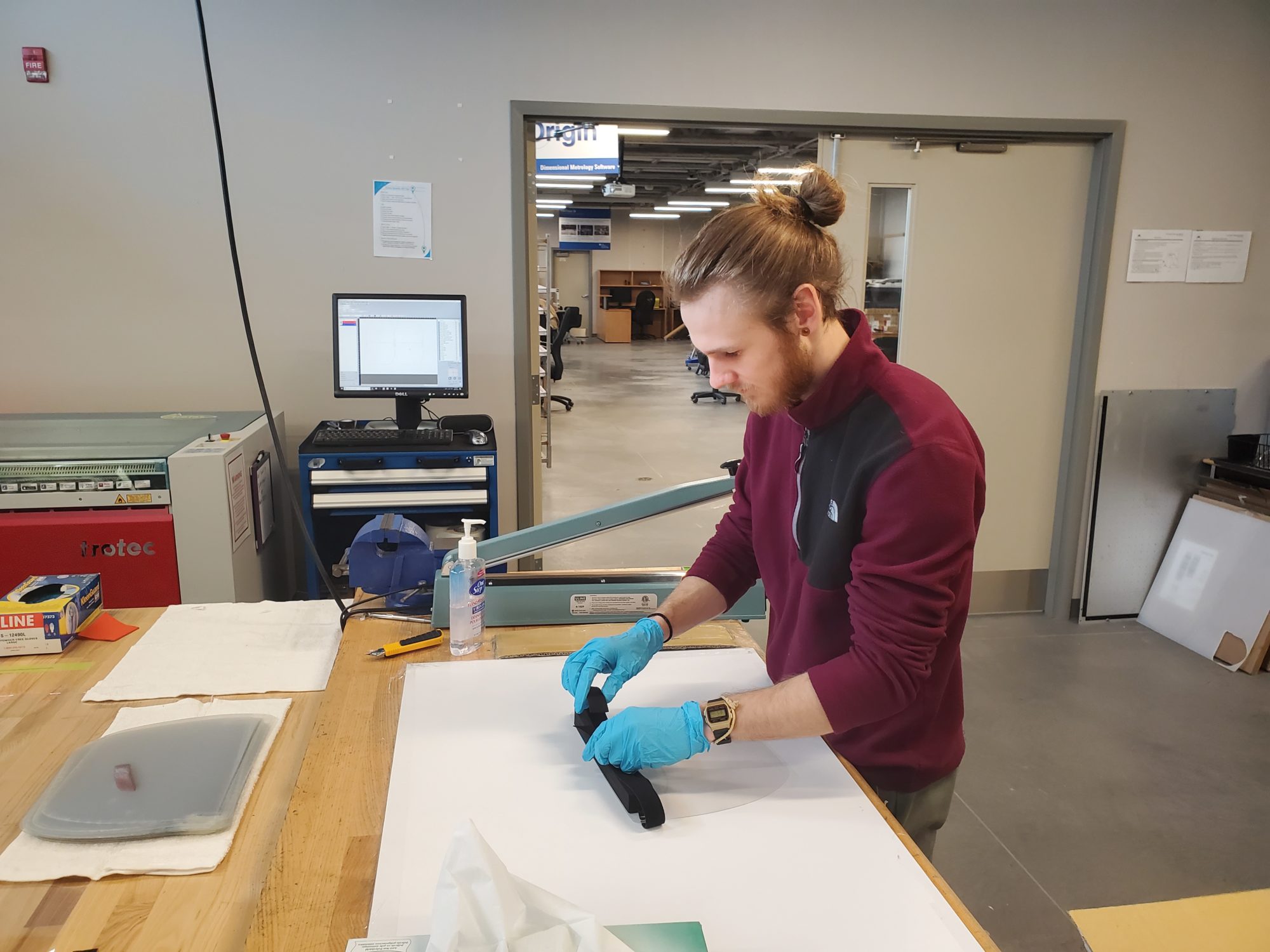In 2020, researchers at Niagara College’s Walker Advanced Manufacturing Innovation Centre (WAMIC) produced a total of 37,000 face shields, certified by Health Canada with a Medical Device Establishment Licence (MDEL Class 1).
WAMIC distributed 17,300 face shields to the local Niagara Health System for front-line workers, with close to 20,000 shields donated to other essential workers and community members throughout the province.
The WAMIC research team used computer-aided design to create the face shield prototype and then partnered with a local industry partner for its die-cutting services to accelerate the number of plastic visors pressed. Niagara-based Jay-Line is a trade-only manufacturer and commercial printer of promotional products and marketing materials.
Brock Husak, research laboratory technologist at WAMIC, was one of only a few graduate students in the research lab assembling the PPE at the start of the pandemic, while both campuses were closed.
“It felt rewarding knowing I was helping the community and the brave front-line workers,” said Husak.
Brian Klassen, former R&I research associate and a graduate of NC’s Electronics Engineering Technology program, had been working on research projects for the Agriculture & Environmental Technologies Innovation Centre prior to the pandemic. Since April, he has been helping in the WAMIC labs to assemble the face shields three days a week.
“It’s nice to know I’m helping to make a difference in a time where Canadians really need help,” said Klassen. “There have also been volunteers from the R&I admin team that have been coming in throughout the week to make shields. It is great to see people stepping up to help, even when they don’t usually work in the labs. We have a great group of people working here.”
Former WAMIC research assistant Rafael Almeida also switched gears from working on IT projects for local industry partners. The NC Computer Programming graduate now divides his time between working on research projects at home and assembling face shields at the R&I labs.
“The experience of working on the face shield assembly line is also valuable as we can watch the whole process closely, find better solutions and apply it to the daily production routine,” said Almeida. “I’m doing my best to be part of the solution here in the Niagara region, and wishing the best for those who risk their lives to serve Canadians during these unprecedented times.”
Amir Gill, director, Capital Planning, Engineering Services, and Biomedical Engineering, Niagara Health, expressed his gratitude for the College’s donation of PPE.
“The Research & Innovation division at Niagara College provided invaluable services at the beginning of the COVID-19 pandemic when PPE inventories were running low, and the supply chains were disrupted,” said Gill. “The Niagara College team stepped in and started to locally manufacture and supply us with face shields. They continued to send us a daily supply until the supply chains were re-established.
“Niagara College manufactured 17,300 face shields over the course of a few months. I would term their efforts heroic, and they definitely helped Niagara Health keep our patients, staff and visitors safe.”
The project was funded by the Niagara College-led Southern Ontario Network for Advanced Manufacturing Innovation (SONAMI) through Federal Economic Development Agency for Southern Ontario (FedDev Ontario) contributions.
In fact all seven of SONAMI’s academic partners took action to combat the health crisis, including Niagara, Conestoga, Fanshawe, Lambton, Mohawk and Sheridan colleges, and McMaster University.
Since 2016, FedDev Ontario has invested more than $20 million in support of SONAMI’s growth efforts in the manufacturing innovation ecosystem. Thanks to flexibilities introduced by FedDev Ontario in response to the COVID-19 pandemic, SONAMI and its member institutions have been able to harness their expertise and pivot their operations to respond to the COVID-19 crisis by building a supply of essential equipment, products and therapeutics for Canadians.
Since the start of the pandemic, SONAMI members worked on a total of 31 COVID-19-related research projects, with total funding from the network at more than $756,000. Projects included: producing PPE, including hand sanitizer; manufacturing a medical device prototype; a ventilator prototype; a portable air filtration system; and exciting research in the treatment for SARS-CoV-2.
New 3D printer to advance COVID-19 research
In November 2020, Niagara College was awarded a grant of close to $50,000 for the purchase of a biomedically compatible 3D printer for its Research & Innovation division to advance its COVID-19 related research.

The state-of-the-art 3D additive manufacturing equipment, expected to arrive in March 2021, will be used by researchers at NC’s Walker Advanced Manufacturing Innovation Centre (WAMIC) at the Welland Campus.
The award, which is part of a special fund of $28 million in research infrastructure support, through the Canada Foundation for Innovation’s (CFI) Exceptional Opportunities Fund will support 79 projects at 52 universities and research hospitals, colleges, polytechnics and Cégeps across Canada.
Until now, WAMIC’s lab capability in this area has been limited to Fused Deposition Modelling (FDM) 3D printers, which are not intended for biomedical material. With this funding and this equipment, research and development projects related to COVID-19 can proceed with the necessary biocompatible and liquid-tight parameters.
“The research infrastructure funded by CFI will expand Niagara College’s capacity to serve a wider array of people in need of specialized protection, testing and life-saving medical assistance,” said Marc Nantel, PhD, NC’s vice-president, Research and External Relations. “COVID-19 has highlighted the need for rapid, inclusive response to public health emergencies, and WAMIC’s research team responded by designing and manufacturing 37,000 face shields for front-line workers with Niagara Health and other essential works in communities throughout Ontario.”
The new biomedically compatible 3D printer will equip NC researchers with the ability to continue COVID-19 related research and development in areas such as addressing special needs modifications to face shields/masks, 3D-printed nasal swabs and a patient-administered saliva collector.
This specialized equipment will also advance the engineering work already done by the WAMIC team in its project with McMaster University and Hamilton Health Sciences (HHS) in developing a 3D-printed video laryngoscope sheath prototype used in COVID-19 patients needing intubation. The project was part of an emergency scenario to prepare for potential supply-chain interruptions.
For clinical patient use, such a device needs to be printed with biocompatible material. Because a parametric CAD model now exists, should a resurgence of infections occur, the 3D printer will enable WAMIC to locally supply laryngoscope inventory matched to observed patient larynx size – avoiding wrong size order delays and waste, added Nantel.
This is welcome news for Amir Gill, Niagara Health’s director of Engineering, Facilities, Biomed, Capital Planning. “With high interest, we are elated to learn of the laryngoscope development,” said Gill. “Supply chains remain insecure and this source is a welcome alternative.”
When it comes to future COVID-19 research with the new 3D printing capabilities, Gill said he supports the methodology of patients being able to collect samples at home, and bring them in for rapid result interpretation to help control community transmission of the disease.
“This proposed process, if adopted, has the potential of reduced face-to-face testing interaction and hence increases safety for health-care professionals,” said Gill.



